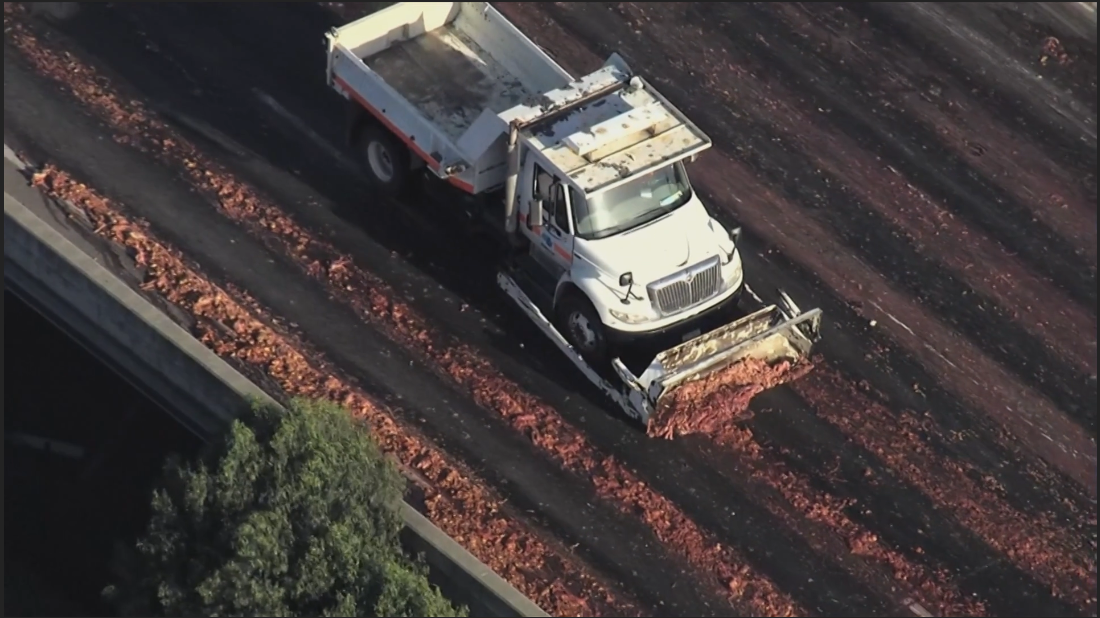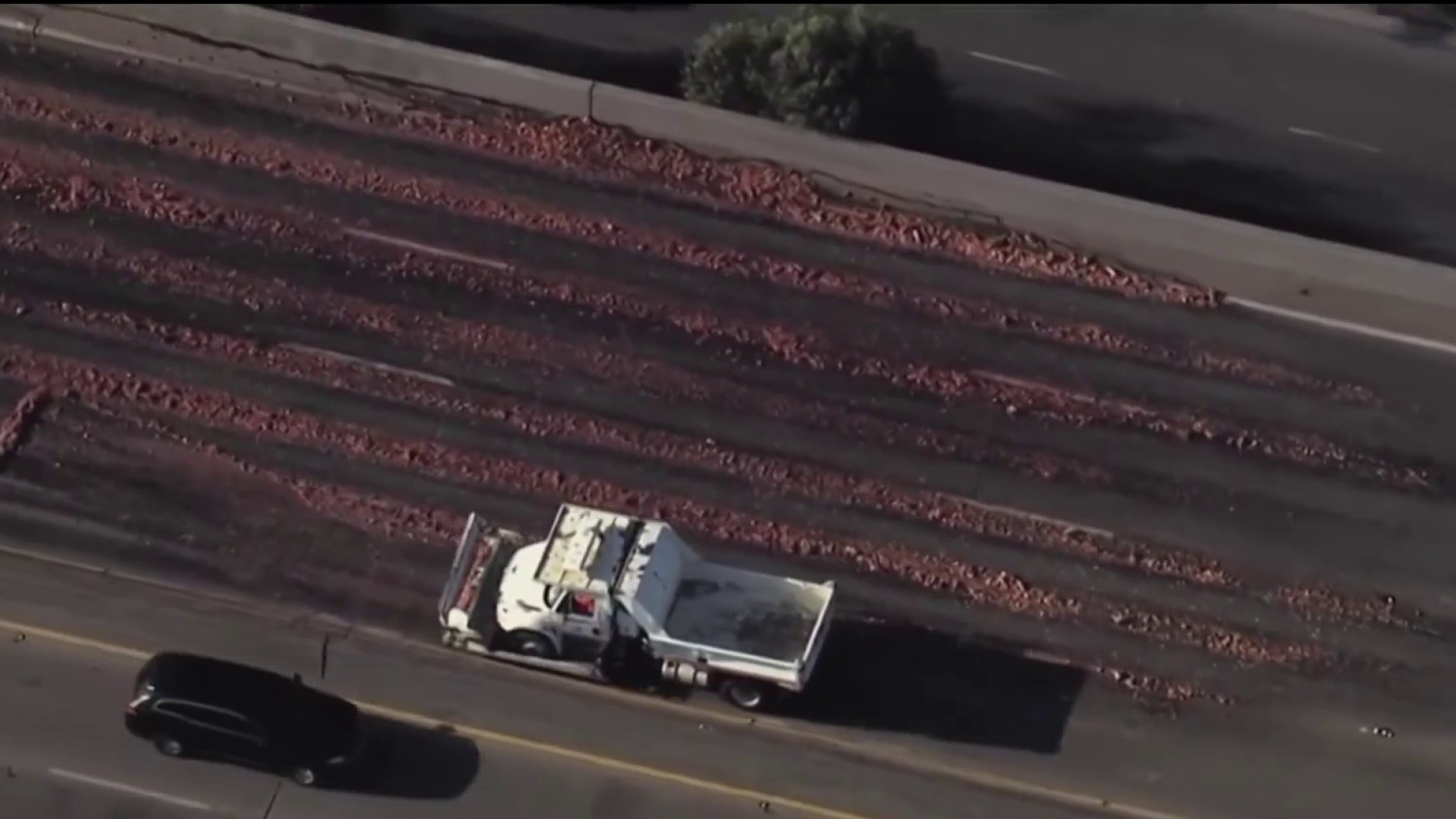Auto safety advocates are calling for stricter regulations on companies transporting animal byproducts after a truck spilled mounds of raw chicken parts across Oakland’s Interstate 880 freeway in May, causing four accidents and jamming traffic for hours.
“There’s clearly something wrong here,” said Cathy Chase, president of Advocates for Highway and Auto Safety, a Washington, DC-based group that regularly makes recommendations to state and federal lawmakers about how to improve safety along America’s roadways.
“When animal byproducts are spilling and leaking onto highways to the detriment and danger of all road users, this is a perfect example of the need for the federal government to step up and evaluate the problem and require a solution.”

Darling Ingredients, a Texas-based animal rendering company, was responsible for the spill, according to the California Highway Patrol. Law enforcement also confirmed to NBC Bay Area the truck’s driver never pulled over after blanketing all four northbound lanes in a gory mess that stretched 300 feet.
The truck was hauling the chicken parts in an open-top trailer, relying only on a tarp to cover the cargo.
As NBC Bay Area’s Investigative Unit first reported in June, Darling Ingredients has a long history of causing similarly gruesome spills across the country, including at least a dozen over the past two years in the small town of Clinton, North Carolina, which left blood, intestines, and animal carcasses spread across the city’s roadways.
“It just comes over the side of the trailers and out on the roadways,” said Clinton Police Chief Anthony Davis, who’s been critical of the company’s cargo containment practices. “The smell is just horrendous.”
Following NBC Bay Area’s reporting, safety advocates are now joining Davis’ call for regulatory changes.
Get a weekly recap of the latest San Francisco Bay Area housing news. >Sign up for NBC Bay Area’s Housing Deconstructed newsletter.
“It seems that from your investigative efforts, there’s a real serious problem here,” Chase said. “We reached out to some commercial vehicle safety inspectors to find out how big of a problem this was, and, surprisingly, it’s a pretty common problem.”
Not only does Darling Ingredients have a history of spills, but the company also has a track record of safety violations.
Darling Ingredients and its subsidiary companies have received at least 39 violations over the past year for either overfilling trucks or failing to properly secure cargo, according to the Federal Motor Carrier Safety Administration, the branch of the Dept. of Transportation responsible for safety oversight and regulations centering around commercial vehicles.
State and federal transportation laws require companies to safely secure their cargo from spilling. However, in many cases, there are no rules governing exactly how to do that, as is the case with the transport of animal byproducts. Other types of cargo, such as hazardous materials, have more stringent containment requirements.
“When any type of product, especially a very slippery one, flies off of a truck, it can cause tremendous havoc on roadways and kill people,” Chase said. “Luckily no one was killed in the last few crashes of this type, but that doesn’t mean that they won’t in the future.”
Within America’s $7.3 billion animal rendering industry, Darling Ingredients ranks as the nation’s second largest company, only behind Tyson Foods. Collectively, the two companies make up about 95% of the U.S. market, according to IBISWorld, a market research firm.
No one was seriously injured in the wake of the Oakland spill, according to the CHP. However, local authorities spent hours cleaning up the mess. The California Department of Transportation declined to disclose the cleanup costs tied to the spill, or whether the agency will try to recoup those expenses from Darling Ingredients.
The CHP said it has not issued any citations to Darling Ingredients for the spill, however, the company’s truck driver who was at the wheel could potentially face criminal consequences.
The CHP recently recommended misdemeanor criminal charges against the driver for failing to secure the truck’s load and for leaving the scene of the spill, according to a spokesperson for the agency. The Alameda County District Attorney’s Office told NBC Bay Area it is currently reviewing the case but has yet to decide on whether to charge the driver.
Neither the driver nor Darling Ingredients responded to NBC Bay Area’s request for comment.
In a previous statement, a spokesperson said the company “deeply” regrets the incident and is “cooperating with all relevant authorities.”
Since the truck’s driver never stopped, law enforcement was left scrambling to figure out who was responsible for the spill.
John Del Rio happened to be driving on the freeway that evening, on his way home from work and helped solve the mystery.
Del Rio’s dash cam was rolling as his car was among the first vehicles to hit the meat pile.
“Oh my god,” the dash cam video captures Del Rio yelling. “Is that meat?”
Del Rio said his car was covered in foul-smelling animal parts. Even after getting a premium car wash, he said he found a piece of animal intestine dangling underneath his vehicle the next day.
“Not to be gross, but my car was covered in it,” Del Rio said. “I had to use the windshield wipers quite a few times there. It was that bad.”
Del Rio said he saw no sign of the offending truck at the site of the spill, but he eventually caught up to it and reported the license plate to a 9-1-1 dispatcher. The truck, covered in meat splatter, was hard to miss, Del Rio said.

“I had never seen anything like that in my life,” he added. “You couldn’t miss it.”
He also sent CHP the video he recorded on his dash cam, which captured the Darling Ingredients logo on the side of the truck.
After driving through the meat mess himself, Del Rio says he cannot understand how a tarp alone can be relied upon to prevent this kind of cargo from spilling over the side of the truck.
“I’m so glad that you guys are bringing attention to this because I honestly feel that something will come from it,” Del Rio said. “They should have their loads secured … it’s got to be sealed.”



